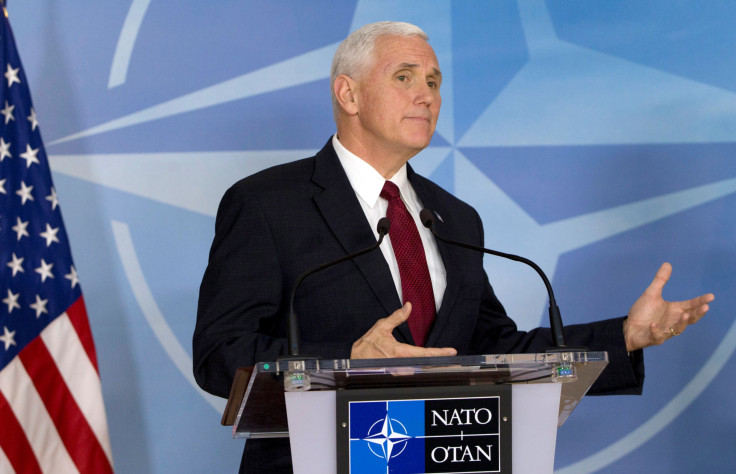Will NATO Pay More Now? Pence-Secretary-General Meeting In Brussels Is 'Productive, Vice President Says'

Calling his Monday meeting with North Atlantic Treaty Alliance Secretary-General Jens Stoltenberg in Brussels “productive,” Vice President Mike Pence somewhat assuaged Europeans’ worries that the U.S. will abandon obligations to fellow NATO members with smaller defense budgets, a notion President Donald Trump often supported on the campaign trail.
Productive meeting with @jensstoltenberg. Under @POTUS, the U.S. strongly supports @NATO because a stronger NATO means a safer world. pic.twitter.com/Sxd1T0x39j
— Vice President Mike Pence Archived (@VP45) February 20, 2017
“We are separated by an ocean, but we are joined by a common heritage, and a common commitment to freedom, democracy and the rule of law,” Pence reportedly said Monday. “We are confident that bond will endure and grow.”
During a NATO summit in Munich over the weekend, Pence was a bit more critical of the alliance, pointing to a NATO requirement, known as a “Capability Target,” that members maintain a defense budget equal to at least 2 percent of their gross domestic products by 2024. The U.S. has by far the largest defense budget in the world, and spends 3.61 percent of its GDP on the military. Aside from the U.S., only Greece, the U.K., Estonia and Poland shell out more than 2 percent of GDP on defense.
“Let me be clear on this one,” Pence said Saturday, to tepid applause. “The United States expects our allies to keep their word, to fulfill this commitment, and for most, that means the time has come to do more.”
As @POTUS Trump has said: for too long, too many in @NATO haven't done their part to fairly pay the cost of our common defense.
— Vice President Mike Pence Archived (@VP45) February 20, 2017
The Trump administration’s demands were “firm and fair,” NATO Secretary-General Jens Stoltenberg told CNBC Saturday.
Trump had previously frightened proponents and members of the alliance when he told the New York Times in July that, under his leadership, the U.S. wouldn’t aid NATO members in Eastern Europe in the event that they faced threats or even attacks from Russia.
“You can’t forget the bills. They have an obligation to make payments. Many NATO nations are not making payments, are not making what they’re supposed to make. That’s a big thing. You can’t say forget that,” Trump told the Times’ David Sanger, who then asked if they can count on the U.S. to fulfill its treaty obligations. “Have they fulfilled their obligations to us? If they fulfill their obligations to us, the answer is yes.”
© Copyright IBTimes 2024. All rights reserved.






















